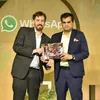[YS Exclusive] WhatsApp Global Head Will Cathcart says India is a ‘huge part of the future for WhatsApp’
In less than a decade since its launch in India, such is its ubiquity that you no longer ‘message’ a person, you ‘WhatsApp’ them. Indeed, both individuals and businesses across the country have found myriad ways of using WhatsApp.
WhatsApp, the private messaging app of social networking giant Facebook Inc, has become India’s preferred mode of communication. With over 400 million users, including more than a million businesses, India is WhatsApp’s fastest-growing market.
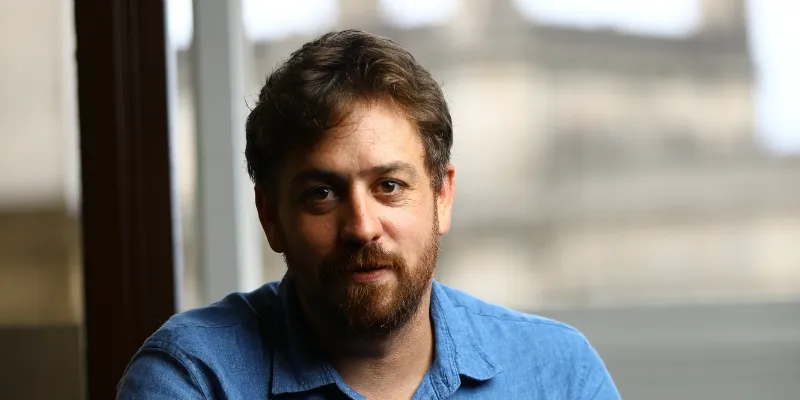
WhatsApp Global Head Will Cathcart
India is also WhatsApp’s ‘most important’ market and a ‘huge part of the future for WhatsApp,’ WhatsApp Global Head Will Cathcart told me during an exclusive interaction in Mumbai, where I caught up with the man steering the platform beyond private messaging to other solutions like payments.
“(India) is the most important (market) if you look at how many people use WhatsApp in India today and what the potential is. It's a huge part of the future for WhatsApp and for the world. And so it's one of the reasons why I'm here. And we built our first-of-a-kind team in India as we really see it as the future,” said Will.
To be sure, in less than a decade since its launch in India, such is its ubiquity that you no longer ‘message’ a person, you ‘WhatsApp’ them. Indeed, both individuals and businesses across the country have found myriad ways of using WhatsApp.
Many small and medium businesses in India, seen as the backbone of the country, have also taken to the app to grow their businesses and offer personalised solutions. All this has enabled the creation of new products and solutions, such as WhatsApp Business and the soon-to-be-launched WhatsApp Payments offering.
“One of the amazing things I've been seeing here in India is just how WhatsApp has become a way of people doing business. If you're a small business, how much of it runs on WhatsApp? Even though it was originally conceived to help people communicate with friends and family, people are using it in amazing ways. And that's given us an opportunity to build products like the small business app.”
Indeed, WhatsApp’s success in India explains why Facebook chose the market to test out its payments solution. Will Cathcart, who is currently in India, put all speculation to rest about the company’s payments solution, and announced that the social messaging app is all set to launch its much-anticipated WhatsApp Payments feature in India this year.
Will told YourStory that WhatsApp’s strategy around payments is very much a partnership model and an India-specific one. The company, which is currently working with the Indian government on the launch of WhatsApp Payments, is keen to work with banks in India to enable their business to reach customers who are using WhatsApp, Will added.
“We're eager to have it launched soon. You see how many people are driving their small businesses through WhatsApp with their customers and think, if we had the ability for them to accept payments through WhatsApp or for people to send money to each other over WhatsApp, it would be hugely impactful and meaningful for people's businesses. So we're really excited and we're working with the government to figure out how to launch it,” Will said.
But WhatsApp Business and WhatsApp Payments may just be the start of several India-specific solutions as the company continues to add new features based on feedback from users.
“For product development, we're starting to think, how do we go listen to what people are doing in India? Based on that, we see what to add… A feature we recently added is product catalogues in the small business app where you can keep a track of the products you have with photos and share them with potential customers when they want to see what you offer. But I think there's going to be tons more we can do,” he added.
In collaboration with YourStory, WhatsApp released ‘A Billion Opportunities’ coffee table book that showcases Indian SMBs making an impact. The book was released at WhatsApp Business for small and medium businesses event in New Delhi on Thursday.
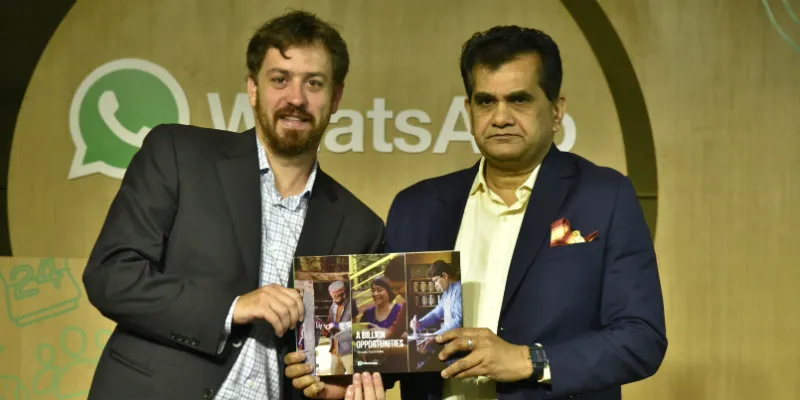
WhatsApp Global Head Will Cathcart with NITI Aayog CEO Amitabh Kant
Read the full excerpt of my interview below.
Shradha Sharma: At the time of your appointment, Mark Zuckerberg said, and I quote, “(Will is) always focused on solving the most important problems for people and clear-eyed about the challenges and tradeoffs we face.” As you’re aware, many of our readers are startups, entrepreneurs, and small business owners who are encountering these challenges and problems every day. Share with us your learnings on how they can emulate this.
Will Cathcart: Well, Mark's very nice to say that. I guess I've been lucky enough to be working at Facebook for nine years now. My background is in product management and so I worked on a lot of our consumer-facing products ranging from newsfeed to the introduction of video and live video to Facebook groups.
One of the things we've done that I think has served us well is focus a lot on the ways people are taking the products we've already built and using them in ways we didn't plan for. For example, we saw tons of people using Facebook groups around a certain interest and then buying and selling things with it. We hadn't built anything into it that was about commerce. So, one of our teams asked, can we build a product like a Facebook marketplace?
And that's something I've always tried to focus on in the projects I've taken up. And I think our teams have done a good job building a culture around that. Coming to WhatsApp, one of the things I was really excited about was seeing just how people are taking such a simple product and using it in increasing ways around their lives.
One of the amazing things I've been seeing here in India is just how WhatsApp has become a way of people doing business. If you're a small business, how much of it runs on WhatsApp? Even though it was originally conceived to help people communicate with friends and family, people are using it in amazing ways. And that's given us an opportunity to build products for that like the small business app.
Shradha Sharma: What I hear you saying is that Facebook and WhatsApp have always been listening very closely to the customers and that's how you look at the impact, right?
Will Cathcart: Yes. It's been really wonderful because it's given us these areas to work on that we know people are going to find useful and valuable because they're already using our products even if they're less efficient for it.
Just to go back to the WhatsApp example. I think the team knew that if we made a business app for small businesses, it would do well because we had already seen small businesses using WhatsApp. We knew if we gave them something with extra tools that were responding to their needs, it would be great for them and we would have millions of people using the app. And the small business app is growing quickly.
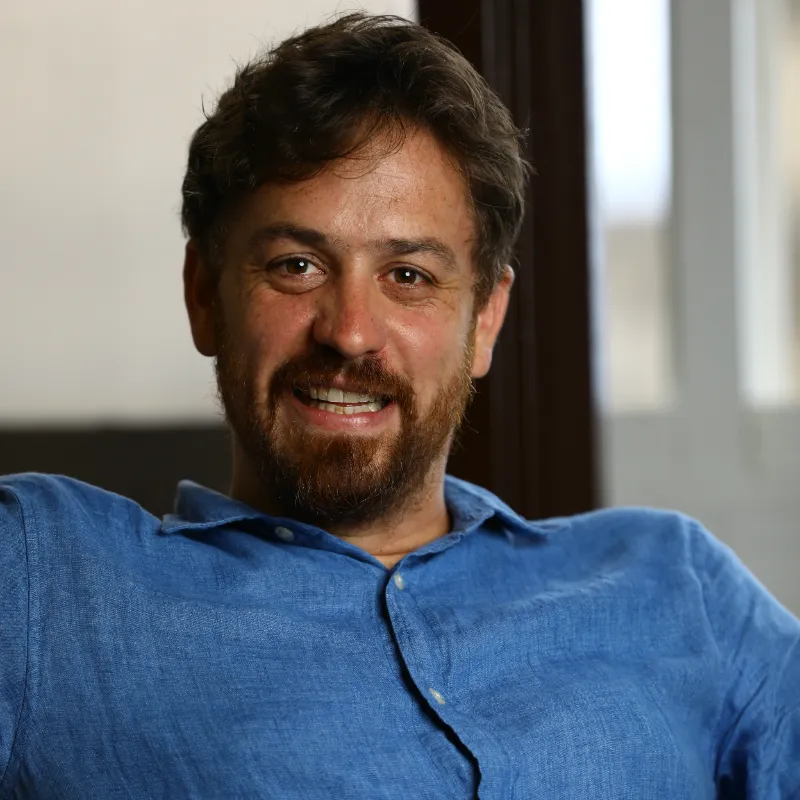
Shradha Sharma: While coming for the interview in this room, I went to the business centre and asked someone for the WhatsApp office. The person got talking and said, ‘WhatsApp has changed my life. It's the best thing that has happened.’ It is like that for everyone in India.
Of course, you are building for your customers and seeing them use the product in different ways. But what has been very exciting for you in this role?
Will Cathcart: It's exciting and humbling to work on something that so many people love and use. And find that it's changed their life or business. I think what's been really exciting for me is it reminds me a lot of when I came to Facebook nine years ago. Here's a product that I use and I love and I'm seeing tons of other people use it. There are lots of opportunities, based on what we're hearing from the people who use WhatsApp, for us to go build things for them that will help their lives, better their communication with their friends, and help their businesses. That is really exciting for me. It's like a chance to join something that is amazing and see what we can do to improve it.
Shradha Sharma: I am always intrigued when meeting someone like you. How do you get to be where you are because when you started, there must have been thousands of people, right? But today you're in this role. For all the youngsters and all the business owners reading this, how do you get to scale yourself and be as a professional here?
Will Cathcart: I think I’ve just been very lucky. I have had a lot of help from great managers and people I've worked with. And I have always tried to find what products someone will really want. Why this will make the lives of our customers better, and be really, really focussed on what's the one thing I can do to help, and keep doing that over and over again and keep getting lucky.
Shradha Sharma: You know, data privacy has been a major cause for concern and WhatsApp has put in place several measures to address privacy concerns. Data encryption is an extremely fundamental core to what you're building. Can you tell us about that because it is one of the biggest conversations in the country?
Will Cathcart: We think it's really fundamental to the product. If you think about the core of WhatsApp, it's helping you have a conversation with someone as if the two of you were sitting together without anyone else in the room.
My wife and I travel for work, and I work pretty far away from our Facebook campuses. Since my wife and I are away a lot of the time, we have all our conversations over WhatsApp. That’s how we keep in touch through the day. Now that I'm on this trip, I'm sending her photos constantly. And we want to feel like we are talking in the same room - privately. You need to know that no one else is listening. It's a core feature of WhatsApp that it can't see what you're saying.
WhatsApp is also doing everything it can to minimise what data we collect about what's going on so that you can feel free to say anything to your spouse, friend, or your family that you wouldn't feel free to say if it felt like other people might be around sitting in on the conversation or following up later.
Shradha Sharma: Do you have a defined privacy policy? Are you evolving that?
Will Cathcart: Yeah, absolutely. I mean, we have a strongly defined policy. We have our privacy policy on our website. But at a high level, the approach is really to try to get as close as we can to this idea of a private face-to-face conversation where WhatsApp is not involved.
That means three things: One, encrypting the conversation. Collecting as little data as we need to run the service. A great example of this that blew me away was you can share your location, even your live location, with someone else. The team went out of their way to build it in a way where WhatsApp never sees the location. We never find out where you are. It's just between you and the other person. This makes sense because you're sharing sensitive information and it helps you be safe and secure to know that no one else can see it.
Second, there are some things where we do need more data for some services but we're always going to try to push how hard we can go with keeping as little data as possible.
And then the third one is the way the product works. Trying to focus on features that match private face-to-face communication. It's one of the reasons why status, for example, can be seen only by your friends or people in your address book. And, we have wonderful versions of that on Instagram and Facebook, but we really want WhatsApp to focus on private communication. So we've chosen features that we think line-up with that.
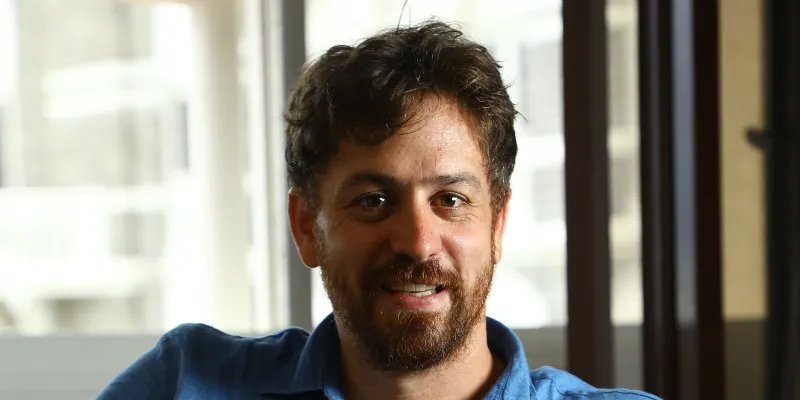
Shradha Sharma: How important is India as a market for you because everyone is using WhatsApp here?
Will Cathcart: I mean, it is the most important one if you look at how many people use WhatsApp in India today and what the potential is. It's a huge part of the future for WhatsApp and for the world. And so it's one of the reasons why I'm here. And we built our first-of-a-kind team in India as we really see it as the future.
Shradha Sharma: Do you track the stories - the impact WhatsApp is creating in this country?
Will Cathcart: We're working on more ways to scale some of the analysis and measure this. But the team really gets incredibly pumped, excited, and inspired hearing how people are taking WhatsApp and using it to change their life, drive their business, and have a huge transformational impact.
Shradha Sharma: What type of businesses have you tied up with? BookMyShow is on the platform. How is that going? How invested is WhatsApp to make that big here because it's still on trial?
Will Cathcart: It’s early days but we think the opportunity is huge, particularly with small businesses. We're very invested in it and looking at what new features we can bring to the platform based on how we're seeing people use WhatsApp today.
Shradha Sharma: WhatsApp payment gateway is another thing that is being talked about here. When is that happening?
Will Cathcart: We're eager to have it launched soon. You see how many people are driving their small businesses through WhatsApp with their customers and think, if we had the ability for them to accept payments through WhatsApp or for people to send money to each other over WhatsApp, it would be hugely impactful and meaningful for people's businesses. So we're really excited and we're working with the government to figure out how to launch it.
Shradha Sharma: Last week, I met the CEO of HDFC Bank, which is the most valuable private bank in India. One of the things he said was that for digital payment platforms, the important thing is that they don't own the customer and the ones who own will lead. But HDFC owns the customer and they are looking at partnering with such digital platforms. And, of course, he also mentioned WhatsApp. I was just wondering how open are you to partnering with different banks?
Will Cathcart: We’re actually working with banks and viewing this as a partnership. We are a platform for communication with people and we want to help facilitate commercial communication. But the right way to do that is with partners who have banking relationships with customers. We just want to help by being a platform to facilitate more transactions.
I think of our strategy around payments is very much a partnership model and it is very much an India-specific model. We started working on payments as there is a tremendous opportunity. So we want to work with banks in India to enable their business to reach customers who are using WhatsApp.
Shradha Sharma: Is there something else besides payment and WhatsApp for Business that you are thinking about in the context of the Indian market?
Will Cathcart: Some of the things we've released recently have actually been specific to or first in India. For example, we just launched the ability to get permissions around who can add you to groups. We hear a lot of feedback from people in India about being added to groups. So, for product development, we're starting to think, how do we go listen to what people are doing in India? Based on that, we see what to add.
In particular, what I'm really excited about this trip is the impact we're already having with small businesses. And finding out what more we can do. Payments are one natural thing that will help accelerate businesses. But what else can we do to help them manage their business through WhatsApp?
A feature we recently added is product catalogues in the small business app where you can keep a track of the products you have with photos and share them with potential customers when they want to see what you offer. But I think there's going to be tons more we can do.
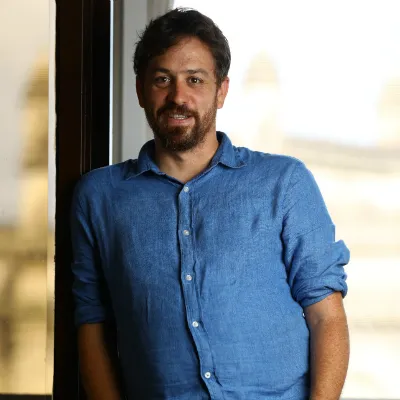
Shradha Sharma: At some point, you are looking at a more tighter integration of WhatsApp with Facebook and Instagram, all which have so many users in India. How can all the three products talk to each other more closely?
Will Cathcart: Yeah, this is something we've talked about at a high level. Mark's talked about how he thinks our products can work together and help make people's lives easier. We see small businesses using Facebook and then putting their phone number and saying, “Reach me on WhatsApp”.
So yeah, one thing we've thought about exploring is are there ways for us to make that easier for people? We don't have any of the concrete specifics yet.
Shradha Sharma: It’s amazing that you have nearly a decade’s experience in Facebook, having led the role of running the Facebook app and made it what it is today. And now, you’ve taken on this global role of heading WhatsApp. On a personal level, what does this mean for you? I ask this because I also hear it’s close to your heart, as your wife and you decided on the name for your daughter over a WhatsApp chat while you were both working in different cities. So, personally, what is the significance of this role?
Will Cathcart: As I mentioned, it's an honour and humbling to be able to work on this. It’s so inspiring for me to work on something which people use over and over again. You know, going through the market and getting to talk to a bunch of business owners and have them say, “You know, I use WhatsApp”, and then have them show you all the conversation threads they have with people.
For me, that's the most invigorating thing in the world. So that's why I was so honoured to get to work on WhatsApp specifically. When Mark asked me, I was like, “Oh my gosh, this is such an opportunity to work on something that people love”. I can hope to add things to it that make it better.
Shradha Sharma: It is a very powerful place to be in. Anything stressful in your role?
Will Cathcart: I want to make sure we're doing a good job. People rely on this, it's such a huge part of their life. And I want to make sure we do a good job. And then, you know, a lot of our work goes into just the reliability of the service.
When we ship new things, there is stress around whether they really meet the expectations of the people. So I think if there's, you know, one thing to stress about it's that or making our product better, reliable, and relevant for people.
Shradha Sharma: What would you say is ‘success’ for you?
Will Cathcart: I mean, if I take India as an example, I would love to be able to look back a few years from now and see how many more hundreds of millions of people have come online and accessed a bunch of digital services, including communication through WhatsApp.
Also, how many more services or capabilities have we added to the platform that have helped make people's lives better. Whether it is people communicating with their friends and family or small businesses driving more economic opportunity.
Shradha Sharma: What's the culture like in WhatsApp when it comes to different markets that you operate in? What's the model like? Do you listen to your local people or is it like, hey, here’s a strategy that has been decided in California. How does that dynamic work?
Will Cathcart: It's really about going around the world and listening to how people use WhatsApp. I think if we were to only listen to how people use it in California, it would be a mistake. I think people in California use it very differently. And, actually not as much like in India or a bunch of other countries.
I think one of the reasons why the team has been so successful compared to many other companies is they've really focused hard on actually seeing how people use it around the world and listening to their needs.
For example, WhatsApp has spent much more time and energy on making the product work really well on very inexpensive phones and very spotty network connections than most apps. And that came from hearing that it was a global need that may not have been as acute in California.
Because the team has built such a culture of listening to what people around the world need, it has led them to build a product that's been, I think, much more successful. And so, we're really hoping to continue that. It's one of the reasons why we're actually taking these trips and hiring as many people as possible.
Shradha Sharma: Is this your first trip to India?
Will Cathcart: It's my second trip. I came once a long time ago. It's amazing. I mean, it's so vibrant and there's so much going on. The energy of all these entrepreneurs who are just going and building these businesses, starting with something very, very small, but finding a way to build something that's adding value to their customers.
That's really exciting to see. And usually you just don't see anything like that, you know?
It's not been exhausting. I mean, it’s a long flight, but otherwise, it's been great.


![[YS Exclusive] WhatsApp Global Head Will Cathcart says India is a ‘huge part of the future for WhatsApp’](https://images.yourstory.com/cs/2/a182c7e0-1407-11e9-87e2-f7248b252f46/WhatsApp_31564140071445.png?mode=crop&crop=faces&ar=2%3A1&format=auto&w=1920&q=75)
